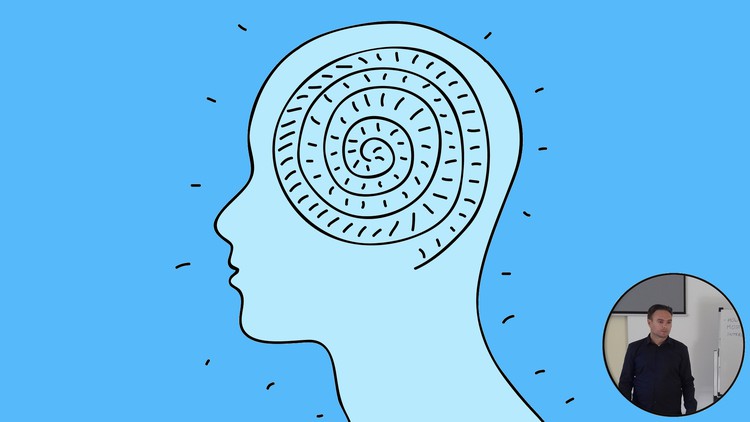Description
This course provides an introduction to Cognitive Behavioral Therapy (CBT), one of the most effective forms of psychotherapy for treating mental health issues like anxiety and depression. You’ll learn the core principles of CBT, which focus on identifying and changing negative thought patterns and behaviors. The course covers key techniques such as cognitive restructuring, exposure therapy, and problem-solving strategies. You’ll also explore how CBT can be applied to various mental health challenges and how to implement these strategies in daily life. By the end of the course, you’ll have a solid understanding of CBT and its practical applications in promoting mental wellness and positive behavior change.
Welcome to “Cognitive Behavioral Therapy (CBT) Basics”! This course provides an introduction to the fundamental principles and techniques of CBT, a widely used and effective therapeutic approach for addressing various mental health issues. You will learn how thoughts, feelings, and behaviors are interconnected, and how modifying negative thought patterns can lead to positive changes in emotional well-being and behavior.
Syllabus
Introduction to CBT
- Overview of cognitive behavioral therapy
- History and development of CBT
Week 2: Theoretical Foundations
- The cognitive model
- Key theorists (e.g., Aaron Beck, Albert Ellis)
Week 3: Cognitive Distortions
- Common cognitive distortions (e.g., black-and-white thinking, catastrophizing)
- Techniques for identifying distortions
Week 4: Challenging Negative Thoughts
- Socratic questioning
- Thought records and reframing
Week 5: Behavioral Interventions
- Behavioral activation
- Exposure therapy basics
Week 6: Coping Mechanisms
- Relaxation techniques
- Mindfulness practices
Week 7: Goal Setting in CBT
- SMART goals
- Tracking progress and accountability
Week 8: Applying CBT to Anxiety and Depression
- Specific CBT techniques for anxiety disorders
- CBT strategies for depression
Week 9: CBT for Stress Management
- Understanding stress and its impact
- CBT techniques for managing stress
Week 10: Ethical Considerations and Future Directions
- Ethical issues in therapy
- Future trends in CBT and mental health care
Conclusion
By the end of this course, you will have a solid understanding of the basics of Cognitive Behavioral Therapy and its practical applications. Whether you are a student, a mental health professional, or someone interested in self-help strategies, you will gain valuable tools to enhance emotional resilience and promote mental well-being.






Nnenna –
“I highly recommend the ‘Cognitive Behavioral Therapy (CBT) Basics’ online course. Its structured lessons and practical exercises provided me with a comprehensive understanding of CBT principles and techniques. The course instructor’s expertise was evident through their clear explanations and real-life examples. I gained valuable insights into my own thoughts and behaviors, empowering me to challenge negative patterns and develop healthier coping mechanisms. Overall, this course has been an invaluable tool in improving my mental well-being and equipping me with lifelong skills for managing challenges.”
Bilikisu –
“This ‘Cognitive Behavioral Therapy (CBT) Basics’ online course has been an absolute game-changer for me. The content was incredibly comprehensive and easy to understand, providing me with a deep understanding of CBT principles and techniques. The interactive exercises and downloadable resources were immensely helpful in applying my knowledge to real-life situations. The course has empowered me with invaluable tools to manage my thoughts, emotions, and behaviors, leading to a significant improvement in my overall well-being. I highly recommend this course to anyone seeking a practical and effective approach to mental health and resilience.”
Modupe –
“This “Cognitive Behavioral Therapy (CBT) Basics” course has been an absolute game-changer for me. The clear and concise lessons have provided me with practical tools to challenge my negative thoughts and behaviors. The instructor’s expert guidance and real-life examples have made the concepts easy to grasp and apply in my daily life. The online format allowed me to learn at my own pace and fit it into my busy schedule, making it incredibly convenient. I highly recommend this course to anyone seeking to improve their mental well-being and gain valuable skills for managing their thoughts and actions.”
Zubairu –
“As a mental health professional, the ‘Cognitive Behavioral Therapy (CBT) Basics’ online course has been an invaluable resource. The bite-sized lessons and practical exercises provided a comprehensive overview of CBT techniques. The interactive format and engaging videos made learning accessible and enjoyable. I highly recommend this course to anyone looking to deepen their understanding of CBT and integrate it into their practice.”
Asuquo –
“This ‘Cognitive Behavioral Therapy (CBT) Basics’ course provided me with a comprehensive understanding of CBT principles and techniques. The online format was accessible and flexible, allowing me to learn at my own pace. The interactive exercises and practical examples enhanced my learning experience, making it both engaging and effective. Through this course, I gained valuable tools for managing negative thoughts and emotions, improving communication skills, and promoting overall well-being. I highly recommend it to anyone seeking to enhance their mental health and personal growth.”
Chisom –
“I highly recommend the ‘Cognitive Behavioral Therapy (CBT) Basics’ course. It provided me with a comprehensive understanding of CBT principles and techniques. The course materials were well-structured and engaging, making it easy to grasp the concepts. I particularly appreciated the interactive exercises and quizzes that reinforced my learning. The instructor was knowledgeable and supportive, creating a positive and motivating environment. I am confident that the skills I gained in this course will benefit me both personally and professionally.”